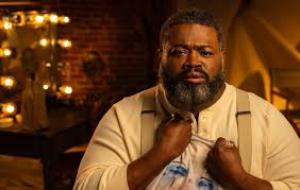
****HIGHLY RECOMMENDED**** Perhaps the most famous double bill that exists within the operatic repertoire -- and, surprisingly, there are more than you might initially imagine -- has returned to Lyric Opera of Chicago. "Cavalleria rusticana" and "Pagliacci," often lovingly referred to as "Cav/Pag," are once again thrilling audiences with their compact storylines, richly melodious scores and morally conflicted characters who, undeterred by their individual fates, end up shining brightly from their rural Calabrian villages. One of the reasons why this production is so special is the fact that it features the Lyric debuts of two exciting new performers: mezzo-soprano Yulia Matochkina as Santuzza and tenor SeokJong Baek as Turiddu, the conflicted lovers at the heart of "Cavalleria rusticana." 4 SPOTLIGHTS

Yulia Matochkina as Santuzza and SeokJong Baek as Turiddu in Cavalleria rusticana. Photo by Todd Rosenberg
The key emotion that these two works have in common is clearly jealousy, which drives each spurned lover (Santuzza in "Cav" and Canio in "Pag") to exact their lethal revenge. Musically, the works have plenty of similarities as well. Encouraged to enter a Milanese music contest, the young Italian composer Pietro Mascagni created "Cavalleria rusticana" in less than two month's time. It premiered in May of 1890 in Rome and was an instant success. Exactly two years and four days later, Ruggero Leoncavallo's "Pagliacci" premiered in Milan. While these two works have shared billing for nearly a century, it is interesting to note that this was not the case here. "Cavalleria rusticana" was first performed by Lyric Opera of Chicago in November of 1955, during their second season as a company. "Pagliacci" arrived in October of 1957.

The Company of Cavalleria rusticana. Photo by Todd Rosenberg
"Cavalleria rusticana" feels much more rooted in the classic realm of Italian opera compared to its counterpart. However, both works were breaking away from previously held ideas of romantic drama and were striving for realism. They both succeeded marvelously. Bringing plenty of verismo to this "Cav" are the aforementioned duo of Matochkina and Baek. The first half of "Cav" is dominated by the powerful performance of Matochkina as Santuzza. Mascagni created a series of three consecutive duets, all of which feature this mezzo-soprano's fortitude. First, Matochkina pairs with Mamma Lucia (contralto Lauren Decker), mother of Turiddu, as she pleads with Lucia to pray for her in her hour of need, lamenting that she has been abandoned in favor of the already married Lola (mezzo-soprano Camille Robles). Next is her confrontation with Turiddu, in which Matochkina and Baek both create vocal fireworks together. Following upon that is the most sinister of all three: Santuzza confessing to Alfio (baritone Quinn Kelsey), who is Lola's husband, that Lola and Turiddu are lovers. It all plays out on a gloriously sunny Easter Sunday, but does not end happily.

The Company of Pagliacci. Photo by Todd Rosenberg
Original director Elijah Moshinsky (whose work has been revived here by Peter McClintock) has put a very unique segment into this "Cav." Midway through, after Santuzza has bared her soul to Alfio, the orchestra plays the very well-known intermezzo. This achingly gorgeous piece of music may be recognizable to you if you have seen Martin Scorsese's film "Raging Bull." Usually, the intermezzo is performed as a sort of intermission, with the stage remaining completely bare. Here, Moshinsky has Matochkina as Santuzza, completely devastated and distraught, remain on stage to perform specifically choreographed movement to the score. The effect is stunning and adds immense emotional sympathy and support for the character of Santuzza.

Quinn Kelsey as Tonio, Daniel Luis Espinal as Beppe, and Gabriella Reyes as Nedda in Pagliacci. Photo by Todd Rosenberg
Quinn Kelsey is doing double duty in this double bill. He is the only performer who appears in both operas. In "Pagliacci" he sings the role of Tonio, a member of a traveling circus in postwar Italy, and opens the opera in front of the curtain, addressing the audience directly and setting up the theatrical artifice of Leoncavalla's ideological construct. Soprano Gabriella Reyes is simply sultry and alluring as Nedda, the sole female amongst the troupe of itinerant entertainers. Baritone Luke Sutliff, in his Lyric debut, makes for a dashing Silvio, who is Nedda's paramour. Tenor Daniel Luis Espinal is cherubic as Beppe, one of the traveling players. But, if "Pagliacci" is going to be truly effective, you need a tenor who can both endear an audience as well as slightly terrify it with his intensity in the role of Canio, the clown. The magnificent Russell Thomas does both, equally well. It is always a pleasure to see this outstanding and accomplished artist at work on Lyric's stage.

Russell Thomas as Canio in Pagliacci. Photo by Andrew Cioffi - Lyric Opera of Chicago
Thomas may have the evening's most celebrated aria (the easily recognizable and oft-recorded "Vesti la giubba") but it is Kelsey who gets to utter the opera's very famous final words.
_______________________________________________________________________
"Cavalleria rusticana" and "Pagliacci" continue through November 23, 2025
Lyric Opera of Chicago is located at 20 North Wacker Drive, Chicago, IL
 Remaining performances are as follows:
Remaining performances are as follows:
Friday, November 7 at 7:00 PM
Sunday, November 9 at 2:00 PM
Wednesday, November 12 at 2:00 PM
Saturday, November 15 at 7:30 PM
Thursday, November 20 at 2:00 PM
Sunday, November 23 at 2:00 PM
Tickets: Please visit www.lyricopera.org or call 312-827-5600
Running time is approximately 3 hours with one intermission
